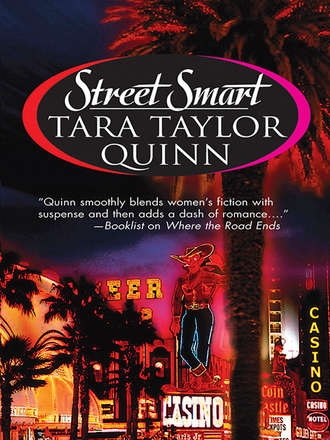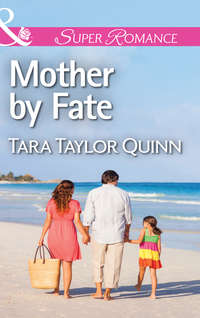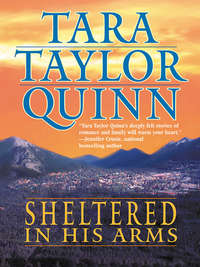
Полная версия
Street Smart
And continued to make…
3
The imprint of four-by-eight-inch bricks against her back was a more familiar sensation than the mattress on her bed at the Lucky Seven. In the past seventy-two hours, Francesca had spent most of her time leaning against that brick wall behind what had to be the least used phone booth in all of Las Vegas. The second day on this corner she’d stood with one foot crossed over the other, dressed in a short, tight denim skirt with four-inch black heels and a skimpy spaghetti-strapped black tank top. The next, she’d planted her shoulder blades against that wall, her rump on the ground and her head lolling back, dressed in rags she’d scavenged in trash Dumpsters. She’d washed them until they were almost too threadbare to wear and then dirtied them up again.
And on Tuesday evening she was there again, leaning one shoulder, her butt and the sole of one thick-soled black boot against the now-familiar wall. This time she was in jeans shorts, a T-shirt that left her belly bare and some black leather wristbands. Looking, she hoped, the way Autumn might have looked when she’d been there.
In the sweltering one-hundred-plus summer temperatures, her feet were sweating profusely in the ankle-length boots.
But she’d garnered nothing in her disguise as a prostitute—except a couple of offers that had insulted her with their low amounts. As a homeless woman, she’d been spit at once and had a couple of dollars thrown her way.
Both characters had attracted more attention than the photographer she’d pretended to be the first few hours she’d staked out the corner her little sister had visited less than two weeks before. Of course, if she’d bothered to take the lens cap off her camera, she might’ve drawn some interest. As a general rule people liked to have their picture taken.
As a nonnegotiable rule, Francesca was through with taking pictures.
A couple of businessmen, dressed all in black from their shiny wing-tip shoes to the suit jackets on their backs, passed by, their sunglasses a bit suspect in the gray evening dusk. But then, this was Las Vegas. It hadn’t taken her a day to figure out that it took one hell of a lot of street smarts to live in this town.
For once, Francesca let the passersby go without question or comment. They couldn’t have any knowledge of her little sister. They just couldn’t.
Derek, call me. Bobbee loves Tom. For a good time call… She stared at the graffiti scribbled in pen, black marker, even pencil on the metal sides of the phone booth. There was much more scribbled inside, bits and pieces of which she randomly recited during her sleep—and to her mother when she called, just so she’d have something to say. After the third day, she’d managed to convince Kay that those calls were doing neither of them any good and she’d phone her as soon as she had news to report. Francesca hoped she wouldn’t hear from her again for at least a few days.
Cars sped around the corner. Others slowed, stopped as the light changed, and still she stood there, leaning nonchalantly, as though she had nowhere to be, nor a care in the world.
She could play this role relatively well. The first part of it was completely true.
A small group of teenagers walked by, young men decked out in black leather and boots, with spiked hair of varying colors and body rings. A couple of them eyed her up, down and back up again. Her stomach tensed but this was what she’d hoped for. Attention from the young crowd.
“Hey, you guys from around here?”
They stopped. Glanced at her with hooded eyes. “Yeah, maybe.”
“You ever seen this girl?” She passed over a two-year-old photo of her sister. It had been taken right before Autumn left home. Francesca had been shocked when she’d first seen it. The pink hair, the piercing at the corner of her sister’s lip, the leather choker were all completely foreign to her.
“Nah, but I wouldn’t mind meeting her,” the tallest guy said.
“Yeah,” echoed the shorter fat one. “You know where she hangs?”
They were nothing but a bunch of tough-acting little kids. Francesca turned away without another word.
Talking in short spurts, the group passed. Five minutes later, a homeless woman shuffled by.
She shook her head silently when Francesca showed her the picture. Francesca gave the woman a five dollar bill. Her reward was another sad shake of the head.
And then a couple of men walked by, their hands full of the cards picturing naked women, phone numbers scrolled across them, that were passed out on the Strip every night of the week in this bizarre and twisted town.
It was one of those times she was thankful not to have Autumn recognized.
“Wonder how much they’re paid,” she muttered as they headed toward the Strip. The colorful glittering lights that made that part of town look like day even in the dead of night were beginning to pop on.
A minute later the streetlight changed. A mother hurried across the street with two little children hanging on to the frayed edge of her shorts, a bag of groceries under one arm. The youngest child, a boy, was crying. Judging by the dual streams of grime running down his face, he’d been at it a while. Francesca watched them turn into the rock-strewn drive of the rent-by-the-month apartment building next to where she was standing. The little girl turned back to look at her. Francesca feigned sudden attention to the massage parlor across the street. It was either that or the pawn shop on the opposite corner, and she’d already read their colorful though roughly painted windows more times than she could count.
Or she could cry.
And then, from out of nowhere, a young girl was inside the phone booth. Francesca had no idea where she’d come from. She’d had her head turned for less than a moment.
The girl was maybe seventeen, but probably younger. She dialed a number she appeared to know by heart. She was little, blond, though she had on an oversize T-shirt and shorts that were longer than most girls her age in this town were wearing. Francesca couldn’t see her shoes inside the phone booth. Nor could she see her face.
Every nerve in her body stiffened as she waited for the girl to finish. She moved forward slowly, as though waiting to make a call, taking deep breaths to calm the tension in her chest. She was a journalist, albeit usually one who hid behind a lens. Still, on more than one occasion, she’d collected some pretty hard-to-come-by information to complete a story.
Francesca was right there at the door of the phone booth just as the girl emerged.
“I’m sorry, were you waiting to make a call?” the girl asked. Her smile was sweet. The look in her eyes made her seem older than Francesca’s mother. And she was at least six months pregnant.
With no ring on her finger.
Choking back the animal wail that rose to her throat as she stared at the girl’s belly, Francesca detached herself. She was a professional—and nothing but. It was a trick that had become habit years ago.
For the first time since…well, for the first time in many weeks, Francesca almost wished she had a camera. This girl was a story that needed to be told.
Just a story. Not a person.
“Uh, yeah,” she said, watching the girl. “I, uh, need to call a cab.”
The girl, standing just outside the booth, smiled again. Her petite features would have been beautiful if life hadn’t tampered with them far too early. Her unlined skin was rough where it should’ve revealed the freshness of youth. And those eyes…
Would her little sister have eyes like that? Could Francesca bear to find out? Could she look in Autumn’s eyes and not lose what little hold she had on any desire to live?
She could only look at the girl’s eyes. Not her belly.
“Well, if that’s all you need, save yourself the fifty cents and just walk a block up there,” the girl was saying, pointing toward the Strip. “There’re always a ton of them milling around.”
“Thanks.” Francesca wondered what someone her sister’s age would say. It had been less than fifteen years since she was a teenager, but it seemed like fifty. She’d felt more confident as a prostitute. “You need a ride?” she asked. “We could share.”
“Nah,” the girl said. “My ride’s coming.”
On a street corner? Was that the call the girl had made?
“I had an appointment up the street. They’re picking me up there.”
And she hadn’t been able to use the phone at her appointment? The reporter in Francesca asked questions while the big sister prayed this child could help her. She’d talked to more than a hundred people in three days.
But before she could haul out her picture, an unmistakable look of fear appeared on the younger girl’s face. “I gotta go,” she called as she turned, and ran across the street—against the light. She’d been watching a navy sedan stopped at the corner of the Strip, waiting to turn toward them.
If she hadn’t had only one mission left in life—to find Autumn—Francesca would have followed her. Followed the blue sedan to see if the girl climbed inside. And to see who was driving.
Could’ve been her mother, of course. And maybe the girl had sneaked away to call her boyfriend.
But somehow Francesca didn’t think so.
This girl had seen too much of life to be afraid of a little parental displeasure. And the fear on her face had been more than concern about being grounded.
Sliding down the familiar brick wall, welcoming the heat against her back and ignoring the light scrape of brick against skin, Francesca wondered, not for the first time, if she had the stomach for what might lie ahead.
Or, more accurately, if she had the heart.
Because she’d figured something out during these days on the streets. If Autumn was more than a passerby, if she’d been living in this town, finding her means of survival here, she wasn’t going to be anything like the young girl Francesca remembered.
And chances were, she’d done things, seen things, her older sister had never, in all her travels, done or seen.
Deciding to give the dinner she’d packed in her satchel to the next homeless person who passed, Francesca leaned her head against the wall and closed her eyes. She’d covered some pretty brutal things during her career. Natural disasters. Murders. Fires. Crime scenes.
Those she could handle.
The death of innocence she could not.
“You have today off, don’t you, Luke?”
Finishing the toaster waffle and coffee he’d fixed himself before dawn Thursday morning, Luke didn’t even lift his glance from the morning paper as he nodded. But the muscles in the back of his neck, and everywhere else he could possibly feel tension, stiffened. He’d hoped to be gone before she got up.
With things growing more tense at work every day that an explanation for the big wins eluded him, and no news on the baby front, he’d made plans for a little stress relief.
“What are you going to do?”
Be free. Out. Away from you.
“Jump.” He spoke almost belligerently, hating himself for doing it even while he deliberately chose the word.
She sank into the chair next to him, her short gray hair askew, her lined face bare and ancient. “Please, son,” she said, watery blue eyes filling with tears. “Please don’t.” She took a deep breath, looking down at the table, one shaky hand clutching the other. “Not ever again,” she said, her voice stronger as her gaze turned on him. “I can’t stand it,” she said. “I can’t sit here knowing that you’re up there, jumping out of planes, falling to your death. I just can’t stand it.”
He’d known his announcement would upset her. He hadn’t expected the shrill voice, the panic in her eyes. He’d been skydiving for years. Had honors packed away in a box from his years as a marine, when he’d been one of the best jumpers they’d had.
It was the one thing he did on a regular basis, just for himself.
“Mom,” he said, his voice softening even as his chest constricted. “You know I’m not going to fall to my death.” He’d expected a fight today—about her wanting him to spend his day off at home, with her. He’d assumed that if she’d caught him before he left, their argument would’ve been about his leaving the house. Not this.
“Luke, no!” Her translucent, bony hand clutched his forearm. “You have to promise me! You’ll never go up there again. You can’t! If you jump, you’ll die. I just know it!” She was sobbing, screaming. He didn’t have to look at her to know the lost, glazed look that would’ve come to Carol Everson’s eyes.
“Mom,” he said, trying to emulate the calm but firm tone his father had always used. Trying, and—as always—failing. “I’ve been jumping since I was sixteen. You’ve watched many times—as recently as last month. Dad explained it all to you, remember?” Turning from the table he leaned forward, holding both of her cold hands between his own warm fingers. “You’re okay with this,” he reminded her.
Jumping was the only thing that had kept him sane during his years as a teenager in this house. He’d joined a club at school and, with the help of his father, had managed to hide it from his mom until he knew for sure he was going to like it. Then they’d had to convince her he was perfectly safe doing this.
“No, Luke!” Her eyes glistened wildly, her entire body starting to shake in the long flannel nightgown she was wearing in spite of the fact that it was summer and she lived in the desert. “I can’t allow it! Please, Luke! I saw a documentary on deaths from skydiving on television last week. Please tell me you won’t go! Not ever again!”
Tears streamed down her face as Luke looked helplessly on.
“The documentary was about the teams that perform aerial tricks. I don’t do any trick jumping,” he said slowly, softly. “I always wear a backup chute. I don’t take any unnecessary chances. I don’t even free-fall very far anymore.” He mentally crossed his fingers on that last one. Free-falling was the best part of the jump and he held the state record.
“No!” She choked. Luke handed her the half-drunk glass of water he’d poured for himself. She didn’t even see it. “Drink,” he said, raising it to her lips.
The glass lay against her lower lip, but he didn’t tip it. Her mouth hung open, unresponsive, and he knew what would happen if he attempted to force the liquid into her. It would dribble down her chin to her chest while she remained completely unaware.
“Oh, God,” she moaned. “Oh, God.” She was rocking back and forth, shaking her head.
Setting the glass on the table, Luke stood, frowning as he stared down at her. She wasn’t going to take skydiving from him, too. Anxiety disorders or not, she just wasn’t.
“Mom.” He tried again, squatting down, meeting her at eye level. He lifted a hand to her face, drying the tears, cupping her cheek. “It’s okay. Shh, it’s okay.”
“It’s not okay, Luke,” she said, her voice trembling with emotions he would never, in a million lifetimes, understand. “It’s not okay. You have no idea what you’re talking about.”
With a heavy sigh he dropped his hand. Straightened. “I’m here, aren’t I?” Shame warmed his skin as he heard the resentment he spent his life trying not to feel. Or at least to hide.
“It’s not okay!” she screamed, rocking, crying, this small pitiful creature who’d borne him.
“I’ll stay home today.” He heard the words, uttered a thousand times before, as if from a distance. Mostly he felt the familiar and deadening weight of obligation and debilitating resentment. Only thoughts of the life that was coming, the son he’d soon have, kept him calm.
“No!” she screamed again. “Tell me, Luke! Promise me!” Head raised, exposing a neck that was so thin, so frail-looking, he could hardly believe it. “You won’t ever jump again!”
Staring at her, Luke couldn’t make the words come. It had been this way for as long as he could remember. It had started with birthday parties. If his father was home he’d been able to go, but as an executive with Biamonte Industries—a position he’d needed to hold to pay his wife’s medical expenses and to keep her world contained enough to allow her to live outside a professional facility—Marshall Everson had had to put in ungodly hours, which also included a fair amount of travel. In later years there’d been dates, games, even a senior trip that Luke had to give up. He’d never been able to sustain membership on a team, be on student council, run for class president, join a club. He’d skydived. It was something he could do privately. On his own time or, rather, the time his father arranged for him.
“Mom…”
It was going to be different with his son. He was going to hire a nanny, ten nannies if he had to, to ensure that his son had all the opportunities he had not.
“Say it, Luke!” Falling forward with the force of the sob that followed, she lay there, chest to her knees, moaning. “Oh, God. I’m going to be…”
Luke grabbed the kitchen trash, put it in front of her and turned his back. When she was finished he handed her a wet cloth, wordlessly waiting while she wiped her face.
She’d be calmer now, at least for a while. She’d be able to swallow her medication and give it time to work.
But this wasn’t the end of it. He knew that.
Just as he knew the woman was slowly sucking the life out of him.
He needed his son, a boy to teach all the things he loved, to play ball with, explore with, watch horror movies with. A boy to bring vibrancy and enthusiasm and messy science experiments into his home.
A son to carry on the Everson name.
A child to give hope and purpose to his future.
A reason to live.
On Thursday evening, just before dusk, Francesca was sitting on her corner, dressed like a teenage homeless person, holding a battered McDonald’s cup out to passersby with a hand that was gloved—even in the July heat—although her glove was fingerless. She’d been observing others for five days and, if nothing else, had a pretty clear idea how to portray any number of characters. For some reason, a lot of the homeless folks covered their hands in some fashion.
Perhaps for trash-digging?
It was a story she’d have wanted to do were she living in another lifetime. With another heart.
She wasn’t showing around the picture as much, though it was always close at hand, securely tucked into the waistband of her torn-and-dirty pair of too-tight jeans. A lot of the same people were coming by. And were starting to notice her.
So she was now permanently homeless—at least in the role she played. It was the only reason she could think of that would allow her to hang out continuously at the same corner. Homeless people seemed to pick a place and stake it out as their own personal property. Probably some kind of homing instinct.
A cop stopped at the corner. She and her mother were in contact with the Las Vegas police and she knew her presence could be explained in a sixty-second phone call if necessary. Still, she’d noticed that a lot of homeless people tended to avoid the eye of anyone in authority. Francesca studied the once-white tennis shoes on her feet.
Did they avoid those glances out of shame? Or fear of punishment? She shrugged the thought away. Everyone had problems. Heartaches. Hard lives. Some were just more obvious than others.
The job she’d done on those shoes wasn’t half bad. She’d had to rub them against the cement in the parking lot outside the Lucky Seven for more than an hour to get that ragged hole in the toe. She’d thrown away the laces and then she’d tossed the shoes around in a big bag with dinner leftovers, shaken them off and left them outside to dry.
For all that, they were the most comfortable pair of shoes she’d had on all week.
The door of the phone booth creaked. Forcing herself to stay in character, to appear disinterested, Francesca slowly turned her gaze toward it. She felt as if she now knew that small booth more intimately than she knew her own body. After five days, she really didn’t expect much. She just didn’t have anything else to do. Anywhere else to go, to look.
She had nowhere to be. Not that week. Not for the rest of her life. Until she ran out of money and needed to eat. But with the savings she’d amassed, that wouldn’t be for a long time. And it wasn’t something she particularly cared about one way or the other, anyway.
A woman stood in the booth, her back to Francesca, dialing quickly.
Francesca had no idea how she was going to earn money when she needed it again. She had no desire to pick up a camera. No inner voice guiding her to the perfect picture. Though she had a few of her cameras in her bag at the Lucky Seven, she hadn’t touched them since that first day in town.
She watched the short brunette, of indeterminate age, as she talked. And then the woman turned.
She couldn’t be more than twenty. If that.
And she was pregnant.
That made the seventh pregnant woman this week. Seven times she’d lost her breath as the sight slammed into her. With practice it was supposed to get easier.
It didn’t.
And this one was so young, barely a child herself. How could she possibly cope? Birth was hard.
And mothering so much harder. What would she do if she went to her baby’s crib one afternoon, reached for him, expecting to pull that tiny warm body into her arms and found it limp and—
No. Forget it. Just forget.
Professional detachment was slow in descending, but as it came Francesca was reminded of the pregnant girl she’d seen in that same phone booth a couple of days before. The girl who’d inadvertently turned up in Francesca’s dream last night.
In the old days that had meant a story for sure.
Today, Francesca was only irritated by the distraction from what mattered. There was no anticipation, no “aha” moment, no real vision of what would be. Just a nagging idea that if she’d had anything left in her, she could have done something. Taken photographs. Told a story…
Still, as the girl finished her conversation, Francesca approached her, holding Autumn’s picture. Her gaze remained at eye level.
“Excuse me,” she said, “I’m looking for my friend. She told me to look her up when I got to town but she moved. The last address I had for her was in those apartments.” She nodded toward the rent-by-the-month place next door. “You wouldn’t happen to have seen her, would you?”
It was one of the lies she’d perfected over the week.
The brunette glanced at the picture. And away.
Another dead end. Francesca wasn’t surprised. She knew she’d have to turn over a lot of nonessential pieces before she found the right one.
And then she realized the girl hadn’t said no. She was looking at the picture again.
“Do you know her?”
Shaking her head, the girl studied Francesca—obviously taking in her tattered clothes, dirty hair, lack of makeup. Even the shoes she’d so carefully aged.
“You hungry?” she asked instead.
No. Not for a long time. “A little.”
“I’ll bet it’s been a while since you had a good meal.”
She shrugged, leaving her shoulders hunched defensively as she’d seen a twenty-something homeless guy do the other day on her way home. He seemed to pretty much hang out in an alleyway between the Lucky Seven and a tattoo parlor.
The girl dropped a buck in the tattered McDonald’s cup. “There’s a discount food mart the next block over. You can get a lot there.”
“Thanks.”
Apparently the gaunt cheeks she’d seen in the bathroom mirror at the Lucky Seven that morning added credibility to the part she was playing. Good to know her lack of desire for any kind of food had paid off somewhere.
“Where you staying?” the young woman asked.
“Around.”
The girl looked at the photo again. She was withholding information. Francesca’s deadened instincts surged for the briefest of seconds.
“You sure you haven’t seen her?” she asked, scuffing her feet. “I could really use a turn of luck.”
“Maybe I have,” the girl said. “I’m not sure.”
Maybe. Those dormant instincts became a little more sharply honed. “Do you have any idea where that might’ve been? Or when?”









